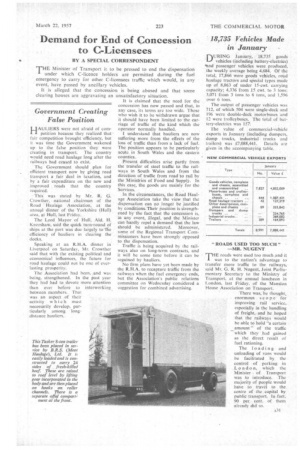Demand for End of Concession to C-Licensees
Page 33

If you've noticed an error in this article please click here to report it so we can fix it.
• BY A SPECIAL CORRESPONDENT
THE Minister of Transport is to be pressed to end the dispensation A under which C-licence holders are permitted during the fuel emergency to carry for other C-licensees traffic which would, in any event, have passed by ancillary vehicles.
It is alleged that the concession is being abused and that some clearing houses are aggravating an unsatisfactory situation.
It is claimed that the need for the concession has now passed and that, in any case, its terms are too wide. Those who wish it to be withdrawn argue that it should have been limited to the carriage of traffic of the kind which the operator normally handled.
understand that hauliers are now suffering more from the effects of the loss of traffic than from a lack of fuel. The position appears to be particularly acute in South Wales and the eastern counties.
Present difficulties arise partly from the transfer of steel traffic to the railways in South Wales and from the direction of traffic from road to rail by the Ministries of Food and Supply. In this case, the goods are mainly for the Services.
In the circumstances, the Road Haulage Association take the view that the dispensation can no longer be justified by conditions. Their position is strengthened by the fact that the concession is, in any event, illegal, and the Minister can hardly repel a demand that the law should he administered. Moreover, some of the Regional Transport Commissioners have been strongly opposed to the dispensation.
Traffic is being acquired by the railways also on long-term contracts, and it will he some time before it can be regained by hauliers.
No firm plans have yet been made by the R.H.A. to recapture traffic from the railways when the fuel emergency ends, but the Association's public relations committee on Wednesday considered a suggestion for combined advertising.
• 18,735 Vehicles Made in January
DURING January, 18,735 goods vehicles (including battery-eleetrics) ittnd passenger vehicles were produced, the weekly average being 4,684. Of the total, 17,866 were goOds vehicles, road haulage tractors and special types made up of 8,863 of under 15-cwt. carrying capacity; 4,336 from 15 cwt. to 3 tons; 3,071 from 3 tons to 6 tons, and 1,596 over 6 tons.
The output of passenger vehicles was 712, of which 504 were single-deck and 196 were double-deck motorbuses and 12 were trolleybuses. The total of battery-electrics was 157.
The value of commercial-vehicle exports in January (including dumpers, dump trucks, industrial trucks and trailers) was £7,088,441. Details are given in the accompanying table.
"ROADS USED TOO MUCH" —MR. NUGENT
THE roads were used too much and it was to the nation's advantage to transfer more traffic to the railways, said Mr. G. R. H. Nugent, Joint Parliamentary Secretary to the Ministry of Transport, at the annual luncheon in London, last Friday, of the Mansion House Association on Transport.
There was, he thought, enormous scope for improving rail service, especially in the handling of freight,. and he hoped that the railways would be able to hold "a certain amount" of the traffic which they had gained as the direct result of fuel rationing.
The loading and unloading of vans would be facilitated by the control of parking in London, which the Minister . of 'Transport was to introduce. The majority of people would have to travel to the centre of the capital by public transport. In fact, 90 per cent. of them already did so.




























































































